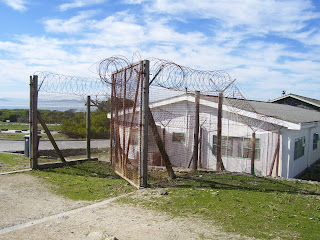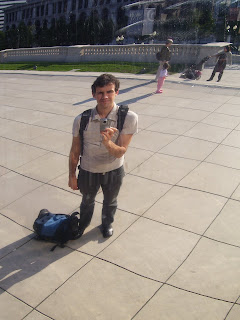

Since I arrived in Cape Town, I have been wanting to go to Robben Island, which was the apartheid government's prison for political opponents of the regime. Nelson Mandela spent eighteen years on the island of his twenty-eight being incarcerated by the government, and most of the ANC leadership (including current President Thabo Mbeki, Walter Sisulu, and many others) were imprisoned here until 1990 and '91. Because they have been doing restorations on Mandela's cell and other parts of the tour, I waited until my last week in the country when these repairs were to be finished. Sadly, they still weren't done when I finally did go to the island last Saturday. It was still very worthwhile, however.
Robben Island ("robben" is "seal" in Dutch, and there are a lot of them there) was used off an on as a prison by  the Dutch and British colonial governments in South Africa, but it was not until the 1960's after the infamous Rivonia Trial that Mandela and other political prisoners were first brought there by the apartheid government. If you have ever been to Alcatraz this is not too different, although Robben Island is quite big compared to "the Rock". At Robben Island, all of the tour guides were once prisoners (reversing the arrangement at Alcatraz, where the tour-guides were once guards - a la "Vicky", R.I.P. Phil Hartman). My tour guide was Michael Mbatha, pictured at right, who was locked up in the early '80s for a number of charges related to his being a member of Umkhonto we Sizwe ("Spear of the Nation") the military wing of the ANC founded after the Rivonia trial (http://www.anc.org.za/ancdocs/history/mk/).
the Dutch and British colonial governments in South Africa, but it was not until the 1960's after the infamous Rivonia Trial that Mandela and other political prisoners were first brought there by the apartheid government. If you have ever been to Alcatraz this is not too different, although Robben Island is quite big compared to "the Rock". At Robben Island, all of the tour guides were once prisoners (reversing the arrangement at Alcatraz, where the tour-guides were once guards - a la "Vicky", R.I.P. Phil Hartman). My tour guide was Michael Mbatha, pictured at right, who was locked up in the early '80s for a number of charges related to his being a member of Umkhonto we Sizwe ("Spear of the Nation") the military wing of the ANC founded after the Rivonia trial (http://www.anc.org.za/ancdocs/history/mk/).
 the Dutch and British colonial governments in South Africa, but it was not until the 1960's after the infamous Rivonia Trial that Mandela and other political prisoners were first brought there by the apartheid government. If you have ever been to Alcatraz this is not too different, although Robben Island is quite big compared to "the Rock". At Robben Island, all of the tour guides were once prisoners (reversing the arrangement at Alcatraz, where the tour-guides were once guards - a la "Vicky", R.I.P. Phil Hartman). My tour guide was Michael Mbatha, pictured at right, who was locked up in the early '80s for a number of charges related to his being a member of Umkhonto we Sizwe ("Spear of the Nation") the military wing of the ANC founded after the Rivonia trial (http://www.anc.org.za/ancdocs/history/mk/).
the Dutch and British colonial governments in South Africa, but it was not until the 1960's after the infamous Rivonia Trial that Mandela and other political prisoners were first brought there by the apartheid government. If you have ever been to Alcatraz this is not too different, although Robben Island is quite big compared to "the Rock". At Robben Island, all of the tour guides were once prisoners (reversing the arrangement at Alcatraz, where the tour-guides were once guards - a la "Vicky", R.I.P. Phil Hartman). My tour guide was Michael Mbatha, pictured at right, who was locked up in the early '80s for a number of charges related to his being a member of Umkhonto we Sizwe ("Spear of the Nation") the military wing of the ANC founded after the Rivonia trial (http://www.anc.org.za/ancdocs/history/mk/). South Africa fought a number of "bush wars" in the 1980s, which the government conducted (at least ostensibly) to fight ANC "terrorists" (like Mr. Mbatha) based in neighboring countries. South Africa invaded every single one of its neighbors (whose governments were all "going native" in the '70s and '80s), occupying what it called "South West Africa" (now Namibia) for a long time as part of its war in Angola, where the CIA, the Soviet Union, and about 300,000 Cuban soldiers (including Ché Guevarra) also got involved in the civil war between the Portuguese colonial government and revolutionary groups. White men were conscripted to fight in the South African Defense Forces, not all of whom necessarily supported the regime. I have had conversations in bars with a couple former soldiers. I don't want to make assumptions about all of these guys, but the ones I've met would get along splendidly with Leonardo DiCapprio's character in "Blood Diamond". Racial reconciliation (not to mention economic restitutuion) has a hell of a long way to go in the country, although given the history it is rather astounding that democracy came about without an all out civil war. The only way the democratic government could be formed was through the implementation of the Truth and Reconciliation Commissions  and their provisions for amnesty for those who confessed their crimes. Since I have nothing better to do, I'll do another post on these before I scoot out of the country.
and their provisions for amnesty for those who confessed their crimes. Since I have nothing better to do, I'll do another post on these before I scoot out of the country.
 and their provisions for amnesty for those who confessed their crimes. Since I have nothing better to do, I'll do another post on these before I scoot out of the country.
and their provisions for amnesty for those who confessed their crimes. Since I have nothing better to do, I'll do another post on these before I scoot out of the country.Back to Robben Island, prisoners were segregated within the walls of the prison in an effort to break prisoners' spirits and keep them divided. "Bantus" (black South Africans) were kept separately from "coloured" and Indian prisoners, given inferior rations (not that these were generous to begin with), and until the Red Cross intervened and provided beds in the mid-'80s everyone slept on roll out mats on the floor. The prisoners wore the same clothes in all seasons, regardless of the temperature, and many suffered chill in the winter. I was a bit disappointed with how blasé my tour group was. No good questions, which would have really improved the experience informationally. They also do the tour too quickly, and you drive all around the island in a bus before you finally get to the prison itself, by which point the tour is two-thirds over. While the tour itself could have been better for me, I still highly recommend the experience of going for anyone who comes to Cape Town. Above note the ironic sign welcoming everyone to the island, and below the stunning view of Table Mountain I had from the boat on the way out.


No comments:
Post a Comment